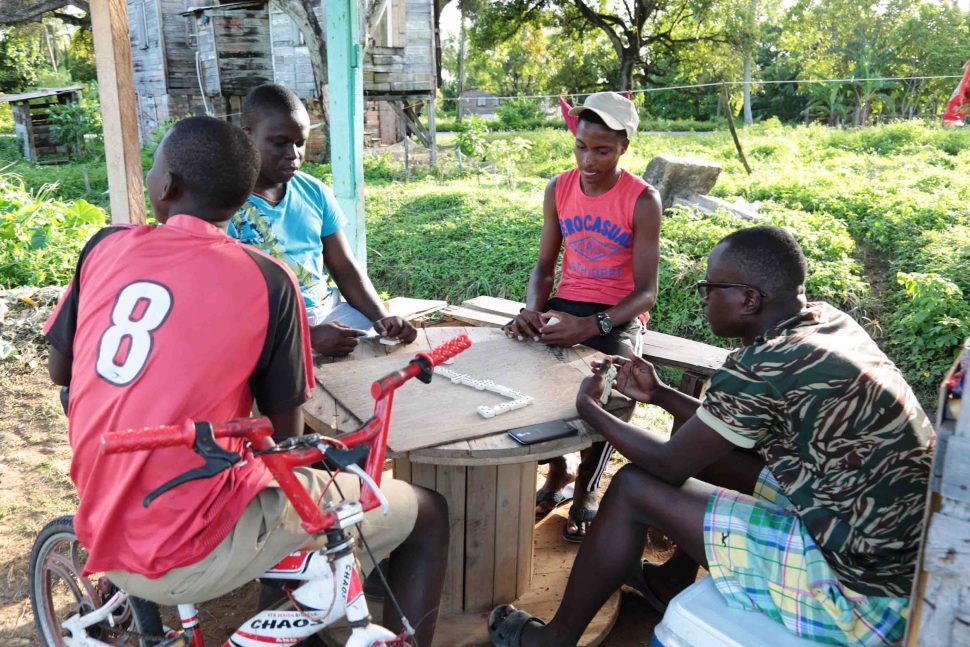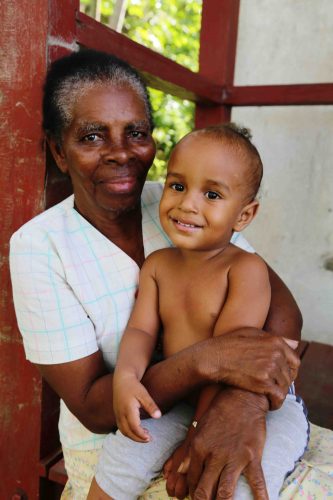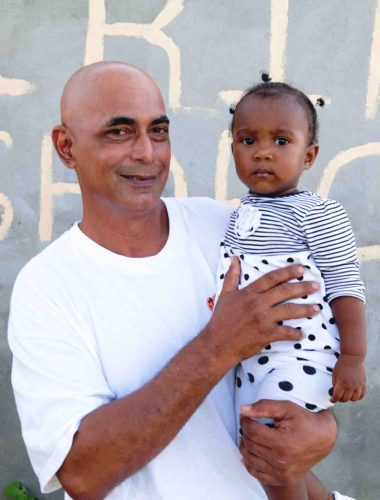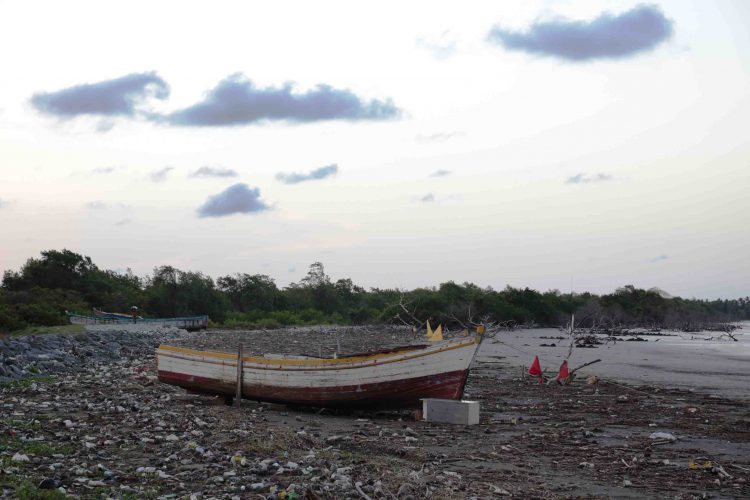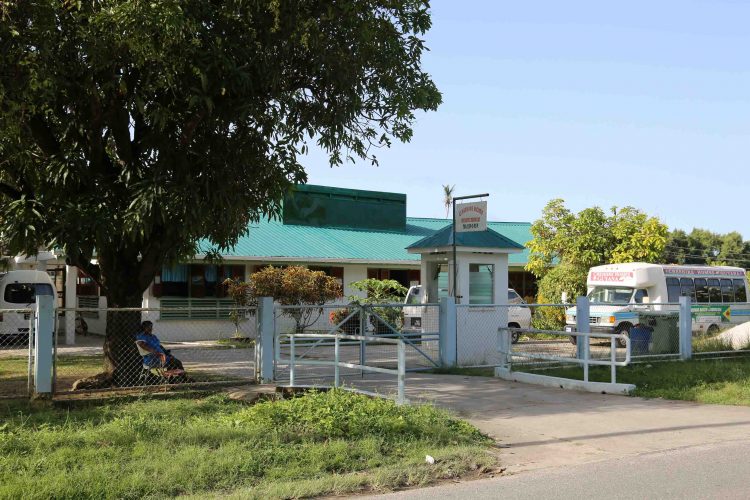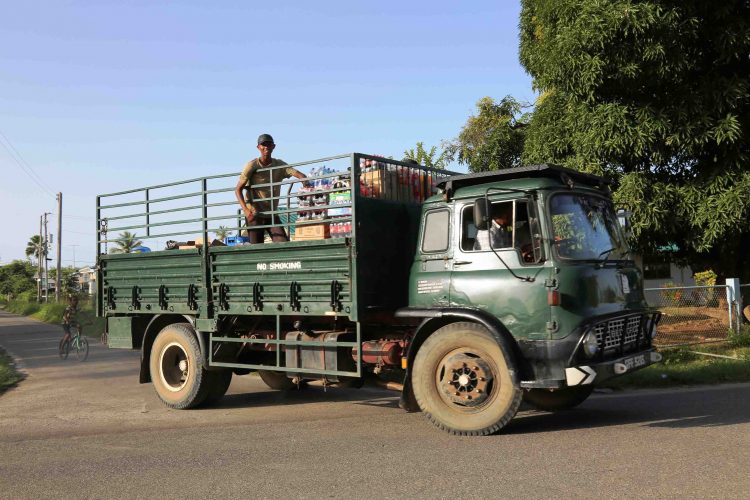Tucked away in the district of Mahaica some 20 miles from the city is the village of Unity, which is divided into three sub-villages: Unity, Lancaster and Mosquito Hall. This week’s edition of World beyond Georgetown features the community of Lancaster, which is home to almost 300 persons.
Though their community is sometimes referred to as Unity, Lancaster residents pride themselves on having shared their village with former president Bharrat Jagdeo, well-celebrated and famous cricketer Shivnarine Chanderpaul and the late Sir David Rose.
Though the village seemed alive with youth, possibly because school is out, it is still shaken by the tragic loss of two young cousins of neighbouring Mosquito Hall who drowned while swimming in the Atlantic Ocean more than a week ago.
They had entered the water at Unity Beach, which runs behind the three sub-villages. According to one resident, the beach can suffice for those not willing to or who do not have the time to travel 100 kilometres to the famous Number 63 Beach.
Lancaster houses the Unity Nursery School, Lancaster Secondary, Unity/Lancaster Mandir, a health centre and the Cheshire Home. The home provides specialized care for children and adults with disabilities. The home was first established in 1972 in a wooden two-storey building that was later replaced by a concrete structure. This was built in three phases—the first being in 2000, the second in 2006 and the last in 2011—providing residents with a more comfortable and spacious home. Initially, there were 20 children, many of whom had been abandoned at hospitals. Phase One includes two dormitories, a physiotherapy area, an office, a waiting area and a courtyard; Phase Two has a kitchen, dining room, laundry and store rooms and Phase Three saw the addition of six self-contained rooms, a library and dining/kitchenette area.
At present the home caters for 27 children and adults. It provides an out-patient service as well. The Cheshire Home would have benefited over the years from monthly, quarterly and annual donations from benefactors, friends and organisations/firms.
Across from the home lives Desiree King and her family. King lived in a part of Unity called Coconut Walk for more than 20 years until her move last November to Lancaster. Originally, she is from Georgetown. What she loves about living in Lancaster is the sea breeze.
King, who is now a pensioner, formerly worked at City Hall, helping to maintain the grounds. She keeps mostly to herself but finds herself at the Seventh Day Adventist Church in Jonestown every Saturday to fellowship with the members there.
She noted that the village has all necessary amenities, but she believes the police should patrol more often or there should be an outpost in the village.
At the end of Lancaster is a junction where two roads meet, one leads to Mosquito Hall, the other led to the Leprosarium, a hospital for lepers. Because of the location of the hospital, the residents of Lancaster and Mosquito Hall were seen as unclean. Patients from all across Guyana were placed in the Leprosarium and subsequently were cured of leprosy. Some stayed on in the villages having found their partners there. Though their spouses and children did not have the disease, they would all be categorized as unclean. The stigma was not helped by those in authority who built two schools: Gibson Primary for the children of Unity and Lancaster Primary for the children of Lancaster and Mosquito Hall. However, the two schools shared the same ballfield and at recess the children played together. Lancaster Primary later became a Secondary School, but the name can still be seen in faded paint on the building.
Decades ago, the Leprosarium had a huge gate across the road at the junction which served as the main entrance into the compound; over the years it came to be called ‘the Gate’. A snackette at the Gate provides more than the service it was built for, Michael Gomes shared. His wife sat in the cool of the closed snackette selling icicles.
“Talk to my husband. He would have a better idea than me since he grow up here,” she said, before calling out for him.
Originally from Campbellville, Gomes settled in Lancaster with his parents and siblings at quite a young age; 46 years later he is still here. He said that while Campbellville is “modern and has proper roads, living here is more beneficial in terms of doing livestock and poultry farming.” The farmer rears, ducks, pigs and layers and sells eggs, ducks and pigs wholesale.
One of his biggest issues is the idle and delinquent youths who would frequently hang out in the evenings at the snackette, often rumoured and seen to be selling marijuana, with some of their customers being minors. This sort of activity makes it dangerous to walk in this particular area of Lancaster at night; there have been numerous robberies. There are also two known cases of young women being raped. Gomes pleaded for tighter security in the area and for more police patrols.
Pointing out the wide grassy track leading to his house, he said that it used to be the main entrance to Unity Beach before the current access road through Mosquito Hall was completed. The man noted that in years gone by cars and buses packed with visitors used the track mostly at the weekend to get to the beach. The track was never upgraded to an actual road, he said, but it would be good if it could.
In one street a group of young men sat under a shed at the roadside playing a game of dominoes. Three young boys hurried by on their bicycles with huge bunches of genips tied to them.
“I am not a permanent resident of the City of Georgetown, but I have spent the majority of the past four years residing in the city and I would say, Unity is a nice place to be, if you are looking for a quiet, slow and laidback place to reside and enjoy some of the luxuries country life has to offer, but you also have to live with the discrepancies…,” said Romario (only name given).
Romario spent almost all of his life in Lancaster and said he knows the good, the bad and the ugly. “… To every coin, there is another side,” he said. “Due to segregation and dislike for people among the smaller villages, due to the fact that one of the areas was once the Leprosarium, conflict arises among the residents of these small neighbouring villages. Even to this day, the youth of the area are taught this custom by their elders and [it] is also being displayed by the youths as well. Aside from this, segregation is also brought about by racial practices and lack of education and cooperation among most homes.”
Although the sub-villages have moved away from this somewhat, there still remains some discrimination where the residents of Lancaster and Mosquito Hall are believed to be of a lower class.
Over the last decade, crime picked up in the area, but the pleas of the people led to a Community Policing Group being formed and a subsequent decline in the crime rate. In addition, it was noted that there are police officers who have to be assisted in one way or another before their help is given: whether financially, with a few beers or even with sexual favours. Otherwise residents blame the force for turning a blind eye to crime.
Meanwhile, Romario drew attention to the behaviour of a number of students attending Lancaster Secondary, whose waywardness is appalling; it was noted that on many days the teachers stand by and watch.
Schoolboys reportedly visit the house of a rumoured drug addict, where they change into clothing which they would have hidden in their bags and proceed to skip school. On numerous occasions persons within the community have tried to have something done about this truancy, it was said, but from the looks of it, things are getting worse. The days when children revered adults seem to be long gone, as well as the days when adults tried to keep children in shape.
At night, the village is plagued by darkness due to the absence of street lamps, with exception of the areas where residents took the initiative to install their own. The absence of street lamps aids more criminal activities.
The roadways of Lancaster are in a deplorable state, as well as the drainage and irrigation. Potable water is provided through the Guyana Water Incorporated, but residents say it is usually discoloured and all they hear are excuses as to why this cannot be addressed.
The village, like most of the country, is plagued with power outages on a regular basis and the quality of internet service is poor.
Nalinie Chowbay (who declined to be photographed) was relaxing on her verandah. A few years after her move to the village she resided in Venezuela with her family for five years but wanting a proper education for her daughter and for her to be proficient in the English Language, they returned and settled in Lancaster.
Chowbay said she never knew that the people in Lancaster were treated like outcasts until she moved to the village. She was never treated differently since her children and husband belonged to Unity and she was from Belmont, Mahaica.
She shared shortly after she moved to Lancaster, she was assisting someone who was cured of leprosy with preparations for a function. Wanting a bigger cahari (saucepan/wok) to prepare food, she asked another neighbour to borrow one, but that neighbour made an excuse. After the function the neighbour told her that they would lend her anything she needed but would not share items with the person who had the function. This has not changed much, she said.
She also mentioned the behaviour of schoolchildren and pleaded for officials to do something to help the students before it’s too late.
Apart from all of this, she likes the area for its quiet and peaceful atmosphere. The main economic activities are fishing and farming; she, like many other women in the community, is a housewife. Her Saturdays are usually taken up at the Mahaica Market, while her Sundays find her at the Jehovah Witness Church in Cambridge, Mahaica.
She wishes to see better roads, the installation of streetlights and a police outpost.
Her daughter Shalinie Chowbay (who also refused to be photographed) sees her village in more of a positive light. Though Unity is divided into three smaller villages, she sees all of it as Unity. She recalled being taught by her teacher to write her address as ‘Unity, Lancaster’. However, today mail addressed to residents of Lancaster no longer have Unity as part of the address, just Lancaster alone. “I’m from Unity, that’s how I always saw it. From the minute I swung the turn to the part where the Bristol sign was, I considered all of it as Unity,” Shalinie explained.
“… There’s no difference from these two places aside from the stigma that lies there… Living here gave me a humble view of life. I feel very sorry when I see children who are not privileged and it’s even more painful that they are not privileged because of the care and the concern that’s not given to them and it’s not their fault. They grow up and some of them might get out of it because of their own self-motivation but there is a lot more that could be given to them for them to be better human beings than they seem to be. Growing up with the children of Unity I can’t count ten children who would have gone on to tertiary education. They hadn’t the attention and care needed from their parents.
“It was always a privilege to learn that the former president came from the village and knowing that someone from this same community could have elevated to become president of the country, it’s a sense of pride. It made me feel as if it doesn’t matter where you’re from, despite the fact that I’m seeing a lot of school dropouts and children who are not well-educated as they should be… the environment doesn’t really define who you are. It doesn’t matter who you are or where you are, as long as you know what you want, that’s what you should work towards and get that accomplished.”
